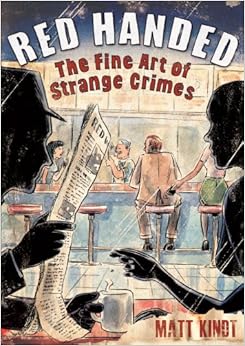
After the last time that I wrote about Laurie R. King's series about Russell and Holmes, I was baffled to learn that the two-volume "God of the Hive" stories had not really gone over very well with the author's fans, a loud number of whom decried what they thought was padding and the cliffhanger ending to the first of the books. This loud number of people is as wrong as wrong could be, those books are terrific. I also got a delightful note from the ageless "Mary Russell" herself on Twitter, informing me that I should not have trusted the biographer William S. Baring-Gould in anything that he claimed about Holmes's son; after all, said biographer made the mad claim that the immortal Holmes had died at some point. Fair point. If our daring duo don't wish to die, I can get behind that.
But not as much as I can get behind a novel in which Mary Russell visits her stepson Nero Wolfe in Manhattan one day. I just cannot get behind Damian at all. I'm allowed to be stubborn. I'm also allowed to breathe a heavy sigh of discontent whenever Russell and Holmes' friends Ali and Mahmoud show up in one of King's chronicles. And the author is allowed to write a book so good that I have little choice but to admit that she mostly beat up my prejudices against these characters. Neat trick.
Garment of Shadows opens with Holmes in Morocco, looking for his wife. Mary Russell was last seen here in the lighthearted novel Pirate King, but she's obtained a head injury and has lost her memory. With the country at a critical point, breaking away from the control of colonial France and Spain and fighting between rival tribes for independence, this is not a good time for our heroine to be at anything other than peak condition. Holmes deduces that Ali and Mahmoud are also in the region, all of our heroes the pawns of Mycroft, as ever manipulating events for the benefit of British interests.
It's an interesting tactic, keeping the reader and the lead character completely in the dark, and, as understanding slowly dawns, it's into a time and place that's probably not very familiar to readers. We may have an idea of which direction Morocco moved in the modern era, but who's to say the political upheavals after World War Two through the 1960s wouldn't have completely changed the direction that Morocco was heading in 1924? For that matter, who's to say that British interests are in anybody else's?
There were moments where I was skeptical, and moments where I had to step back and reread some of the descriptions so that I could get a better visual sense of what was going on - it's an awful habit I have, being so caught up in dialogue that I miss vital scenery and staging - but this was certainly a pleasure to read and kept me guessing throughout. Recommended.





